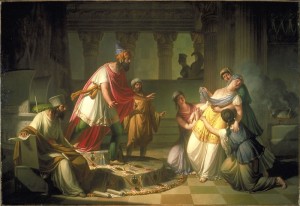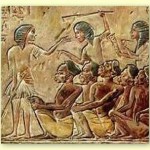Many have written in recent days about the wildly popular new movie The Hunger Games based on the book series of the same name. There have been those who have written about it from a political perspective and those who have analyzed it from an artistic  perspective, and of course, those who have viewed it from a religious lens. In regards to the latter category, many Jewish writers have focused in on its connection to the holiday of Passover, which we are currently in the midst of it. The story line, with its dystopian future, oppressive regime and a people yearning to be free, does bear some remarkable similarities to the narrative of the Exodus celebrated on Passover. However, I believe there is another Jewish comparison that has been overlooked and sheds an even greater depth on the relationship of God to humanity.
perspective, and of course, those who have viewed it from a religious lens. In regards to the latter category, many Jewish writers have focused in on its connection to the holiday of Passover, which we are currently in the midst of it. The story line, with its dystopian future, oppressive regime and a people yearning to be free, does bear some remarkable similarities to the narrative of the Exodus celebrated on Passover. However, I believe there is another Jewish comparison that has been overlooked and sheds an even greater depth on the relationship of God to humanity.
It was only a short while ago that Jews around the world celebrated the holiday of Purim. It is during the Purim festivities and rituals that we recall the attempted genocide of the Jews in the Persian Empire by the hands of the wicked adviser to the King, Haman. The Book of Esther, the Biblical text detailing the story, is primarily noteworthy for one conspicuous absence — especially since it is part of the canon of the Hebrew Bible —  any mention of God whatsoever. The entire episode is played out solely in the realm of human activity; no miracles and no Divine prophecy. It is a story of romance, political intrigue and careful negotiations and diplomacy. The closest we come to any mention of God is a careful reading of the name of the heroine, Esther, which in Hebrew means hidden or concealed. This is a story of Divine concealment and it reflects a world where one needs to look carefully to find traces of God. The story of Purim and the world it presents is one a modern person can deeply relate to and connect to.
any mention of God whatsoever. The entire episode is played out solely in the realm of human activity; no miracles and no Divine prophecy. It is a story of romance, political intrigue and careful negotiations and diplomacy. The closest we come to any mention of God is a careful reading of the name of the heroine, Esther, which in Hebrew means hidden or concealed. This is a story of Divine concealment and it reflects a world where one needs to look carefully to find traces of God. The story of Purim and the world it presents is one a modern person can deeply relate to and connect to.
The picture presented in The Hunger Games is one also of concealment and hiddenness. It puts forth a harsh and vicious world, where one needs to use every tool at their disposal to survive. Yet, throughout the story line, there are small moments of surprise blessings; a relationship nurtured, an extra ration of food discovered, a tree branch to seek refuge on. These moments within the epic story of brutality and cruelty can almost go unnoticed but it is precisely these moments that are so crucial. It is the ability to look past the sheer luck of being at the right place at the right time, as Mordechai in the Purim story told Esther (Esther 4:14), and to see the faint hints of a Divine hand leading the way and preparing the groundwork for one’s success.
To be able to peer past the curtains of Divine concealment, even for just a passing moment, and to glimpse the way in which God is involved in our lives on a daily basis, is the struggle and the challenge that Purim annually presents to us and which The Hunger Games so excellently depicted.












